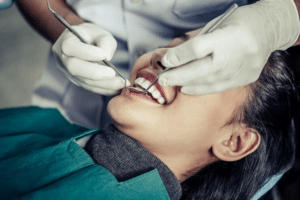In the ever-evolving landscape of dentistry, holistic approaches are gaining traction for their comprehensive focus on overall well-being. Beyond mere tooth care, holistic dentistry emphasizes the interconnectedness of oral health with the body’s systemic health. This paradigm shift is reshaping how we perceive dental treatments, placing a premium on biocompatible materials, minimally invasive procedures, and personalized patient care.
At its core, holistic dentistry embodies a philosophy that views the mouth as a gateway to the body, recognizing the profound impact of oral health on systemic health. By embracing preventive measures, individualized treatment plans, and a whole-body approach, holistic dentistry offers a holistic solution to dental care, promoting not just healthy smiles but also vibrant well-being. Read into the benefits and principles of holistic dentistry, exploring how this approach is revolutionizing oral health care for the better.
Understanding Holistic Dentistry
Holistic dentistry, also known as biological or alternative dentistry, encompasses a philosophy that considers oral health in the context of overall well-being. Unlike traditional dentistry, which often focuses solely on treating dental issues, holistic dentistry emphasizes the interconnectedness of oral health with the body’s systemic health. This approach prioritizes preventive measures and minimally invasive treatments to promote not only healthy teeth and gums but also overall vitality.
Definition and Principles of Holistic Dentistry:
- Holistic dentistry adopts a patient-centered approach, considering the individual’s physical, emotional, and spiritual health in treatment plans.
- It emphasizes the use of biocompatible materials and procedures that minimize the body’s exposure to potentially harmful substances.
- The holistic dentist seeks to identify and address the underlying causes of dental issues rather than merely treating symptoms.
- Prevention is paramount in holistic dentistry, with an emphasis on patient education, nutrition, and lifestyle factors that contribute to oral and systemic health.
- The holistic dentist collaborates with other healthcare providers to ensure comprehensive care and holistic well-being for the patient.
Comparison with Traditional Dentistry Practices:
- Traditional dentistry often focuses primarily on treating dental problems as they arise, without considering their broader impact on overall health.
- It may rely more heavily on invasive procedures, such as fillings, root canals, and extractions, to address dental issues.
- Traditional dentistry may use materials containing mercury or other potentially toxic substances, which are avoided in holistic dentistry.
- Unlike holistic dentistry, traditional approaches may not prioritize preventive measures or consider the patient’s overall health and wellness in treatment plans.
- Holistic dentistry emphasizes a partnership between the dentist and patient, empowering individuals to take an active role in their oral health and well-being.

Minimally Invasive Procedures
Minimally invasive dental procedures are techniques aimed at preserving as much of the natural tooth structure as possible while effectively treating dental issues. These procedures prioritize conservative approaches over more invasive interventions, aligning with the principles of holistic dentistry.
Examples of Minimally Invasive Dental Procedures:
Composite Fillings: Unlike traditional metal amalgam fillings, composite fillings require less removal of healthy tooth structure and offer a more natural appearance.
Dental Bonding: This procedure involves applying a tooth-colored composite resin to repair minor chips, cracks, or gaps in teeth without the need for extensive drilling.
Air Abrasion: Air abrasion utilizes a stream of fine particles to remove decay or surface stains from teeth, minimizing the need for drilling and preserving healthy tooth enamel.
Laser Dentistry: Laser technology allows for precise and minimally invasive treatment of various dental conditions, including gum disease, cavities, and soft tissue procedures.
Preventive Sealants: Sealants are thin coatings applied to the chewing surfaces of molars to prevent decay. They offer a non-invasive way to protect teeth from cavities.
Advantages of Minimally Invasive Approaches in Holistic Dentistry:
- Preservation of Natural Tooth Structure: Minimally invasive techniques prioritize conserving healthy tooth structure, reducing the risk of further damage or complications.
- Reduced Discomfort and Recovery Time: Patients often experience less discomfort and faster recovery following minimally invasive procedures compared to more invasive treatments.
- Biocompatibility: Many minimally invasive materials used in holistic dentistry are biocompatible, reducing the risk of adverse reactions and promoting overall health.
- Enhanced Aesthetics: Minimally invasive procedures often result in more aesthetically pleasing outcomes, as they preserve the natural appearance of teeth and gums.
- Long-Term Oral Health Benefits: By preserving natural tooth structure and minimizing trauma to oral tissues, minimally invasive approaches support long-term oral health and wellness.
Focus on Preventive Care
Preventive care plays a central role in holistic dentistry, emphasizing proactive measures to maintain oral health and prevent dental issues before they arise. In holistic approaches, preventive care extends beyond routine cleanings and check-ups to encompass a comprehensive approach to oral and overall wellness.
Importance of Preventive Dentistry in Holistic Approaches:
Early Detection of Dental Issues: Regular preventive visits allow holistic dentists to detect potential dental problems in their early stages, facilitating prompt intervention and preventing more significant issues.
Emphasis on Patient Education: Holistic dentistry places a strong emphasis on patient education, empowering individuals to take an active role in their oral health through proper hygiene practices, nutrition, and lifestyle choices.
Whole-Body Health Connection: By addressing oral health as an integral part of overall wellness, preventive dentistry in holistic approaches acknowledges the interconnectedness between oral health and systemic health, promoting holistic well-being.
Minimization of Intervention: Preventive dentistry focuses on proactive measures to maintain oral health, reducing the need for invasive treatments and preserving natural tooth structure whenever possible.
Strategies for Preventive Care in Holistic Dentistry:
Personalized Treatment Plans: Holistic dentists develop individualized treatment plans tailored to each patient’s unique needs, incorporating preventive measures based on their oral health status and overall wellness goals.
Nutritional Counseling: Holistic dentistry includes nutritional counseling to educate patients about foods and dietary habits that promote oral health and support overall well-being.
Lifestyle Recommendations: Holistic dentists offer lifestyle recommendations, such as stress management techniques and sleep hygiene practices, to optimize oral and systemic health.
Integrative Therapies: Some holistic dental practices may integrate complementary therapies, such as acupuncture or herbal remedies, to support preventive care and overall wellness.
Whole-Body Health Connection
Holistic dentistry acknowledges the profound connection between oral health and overall well-being, recognizing that dental health is intricately linked to systemic health. By addressing both oral and systemic health concerns, holistic dentistry aims to optimize overall wellness and enhance quality of life.
The Link between Oral Health and Overall Well-being:
Oral-Systemic Health Interconnection: Research has established correlations between oral health and various systemic conditions, including cardiovascular disease, diabetes, and respiratory infections.
Impact of Oral Health on Systemic Health: Poor oral health, such as gum disease and oral infections, can contribute to systemic inflammation and exacerbate existing health conditions, highlighting the importance of maintaining optimal oral hygiene.
Bidirectional Relationship: The relationship between oral health and systemic health is bidirectional, with systemic conditions also influencing oral health outcomes. For example, diabetes can increase the risk of gum disease, while oral infections may exacerbate respiratory conditions.
How Holistic Dentistry Addresses Systemic Health Issues?
Comprehensive Assessment: Holistic dentists conduct thorough evaluations of patients’ oral and overall health, considering factors such as medical history, lifestyle habits, and environmental exposures to identify potential systemic health issues.
Integrated Treatment Approach: Holistic dentistry integrates dental care with other healthcare disciplines, collaborating with medical professionals to address systemic health issues comprehensively.
Emphasis on Preventive Measures: Holistic dentists prioritize preventive strategies to maintain oral and systemic health, emphasizing lifestyle modifications, nutrition, and stress management techniques to support overall wellness.
Individualized Care Plans: Treatment plans in holistic dentistry are tailored to each patient’s unique needs, incorporating interventions aimed at improving both oral and systemic health outcomes.
Holistic dentistry offers a comprehensive approach to oral health that considers the interconnectedness of the body’s systems. By focusing on minimally invasive procedures, preventive care, and addressing systemic health issues, holistic dentistry promotes overall wellness, emphasizing the vital link between oral health and systemic well-being.



